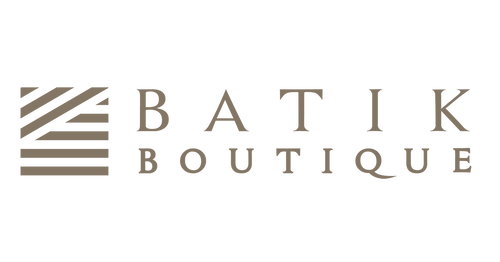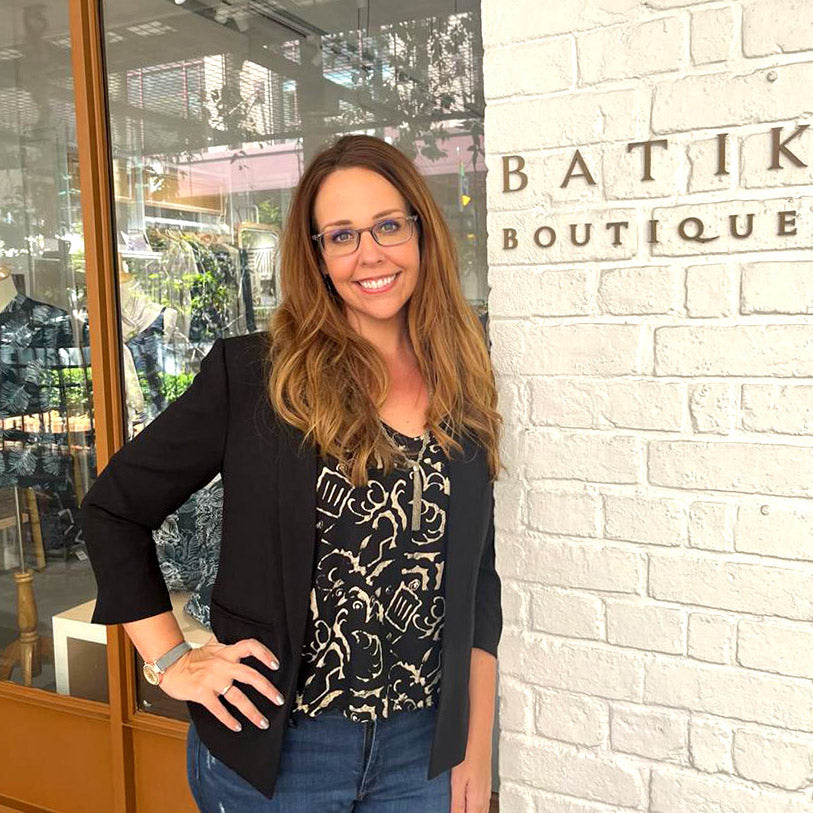Batik Boutique- Where the "art's got heart"

In a tiny one-bedroom flat in Kuala Lumpur, Noor cranked up an ancient sewing machine, lent to her by a neighbour. Her two youngest children were asleep, her five older ones at school – so she seized the opportunity to work. Silky batik fabric slid rapidly beneath her fingers, emerging as lovely scarves. While she sewed, she allowed herself to dream. She dreamt of buying a new sewing machine. Of creating beautiful baju kurung in the latest styles. Maybe even opening her own shop.
“Azam saya untuk ubah cara hidup keluarga saya,” (my dream is to change my family’s lifestyle) she says shyly.

It is thanks to the broadly smiling American lady sitting across her that Noor even dares to dream. Amy Blair founded and runs The Batik Boutique – a company that employs women like Noor to create beautiful handmade and hand-dyed batik products. The products, which include stylish totes, clutches, scarves and aprons, are sold to an expanding global community of people who appreciate both the heart and art behind the range.
Noor’s husband, Nazri, supports his large family by driving a van. Income is erratic, especially during school holidays. If he’s lucky, he gets to help at a friend’s burger stall, or deliver goods. The family often goes hungry. Since Noor started sewing, however, they’ve enjoyed balanced meals and have started saving. It also allowed the family to balik kampung during the recent Raya holidays – a thought that makes her smile.
Through The Batik Boutique, more than 20 women – of which half are single mums and low income earners – have gained a marketable skill and a means to earn extra money. The women are paid per piece at a rate they set themselves. Thereafter, a further 20% is given to charities which focus on health care and education.

The story begins in 2009, two years after Amy moved to Malaysia with her husband Ryan, and shortly after their first son Jackson was born. The family had hired a local cleaning lady, Ana, and two women struck up a friendship. Amy learnt that Ana was a recently divorced single mum with two teenage kids, and often struggled to make ends meet.
“We began to brainstorm what we could do to help her earn some extra money. Make kueh? Nasi lemak? Cookies, maybe? Then, I found out she had a sewing machine,” said Amy.
They bought a few sarongs and made a bunch of aprons and coaster sets, which Amy brought back to America as gifts. The Americans went crazy for them, and demanded more. She enlisted more women, fine-tuned the product, and bumped up the marketing. Word spread, and soon clothes and accessory stores came knocking. Then corporations showed up, requesting bulk corporate gifts. Every Christmas, excited American ladies begged to include her stuff in their girly ‘Shopping with a purpose’ parties. Most recently, Amy was asked to design collections for several Fairtrade companies – though she can’t reveal which ones yet.
Amy’s devotion to the project is certainly inspiring, but also kind of insane. She’s running the show almost single-handedly, negotiating deals in a language she’s not familiar with, and perhaps most amazingly, navigating an alien culture that’s loosely guided by unspoken (and notoriously complicated) etiquette. On any given day, she’s whizzing up the coast to meet the batik artists, trekking into remote villages to drop off cloth to her seamstresses, arguing with officials who think this orang puteh is trying to exploit Malaysia’s poor and soothing irate American buyers who don’t really care that batik production depends on the whims of the weather. And all that while being soccer mom to two adorable munchkins.

The biggest challenge, ironically, sometimes comes from the very people she’s trying to help.
On the particular day she met us, she had just driven for the better part of an hour to a village in Kundang to get some simple zippered pouches sewn, only to have the tailors say they didn’t want to do it. Why? Because the job was too hard. But didn’t they need the money? We’re okay for now. What about earning more for savings? Shrug.
Amy took a deep breath. A frown puckered her forehead as she tried to work out her alternatives.
“This kind of thing happens all the time. It’s one of the hardest things about the work. I really want to help people, who obviously need the help, but sometimes they don’t seem to want to be helped,” she said with a wry smile.
She confesses that this nonchalant attitude is something she doesn’t quite understand – especially coming from corporate America – but she now accepts it as part of working with the poor.

Getting business off the ground has been an uphill slog, and Amy continues to battle daily setbacks. But she’s not giving up. She’s in it for the long haul.
“A part of me is now Malaysian. I love her people, I love her culture,” she beamed. When Amy and her husband Ryan moved to Malaysia seven years ago, they thought it was going to be a short stopover for Ryan to complete his studies. They ended up falling in love with Malaysia, and now can’t imagine leaving.
“Batik is beautiful. The rest of the world needs to see it. And there are so many women like Noor out there, who need an opportunity like this to turn their lives around.”
She told of how Noor, armed with her newly acquired sewing skills, made some pencil cases for her daughter, who sold them in school.
“I loved that. I loved it that she’s been empowered through the skills she learnt from us. This is why I’ll keep doing what I do. It’s seeing the small differences it makes in people’s lives that keeps me going.”
0 comments

